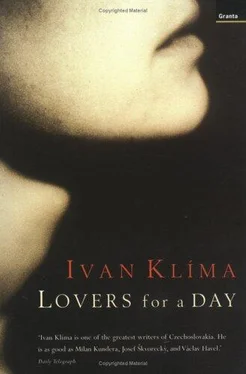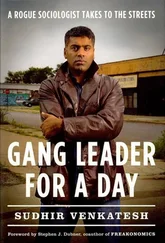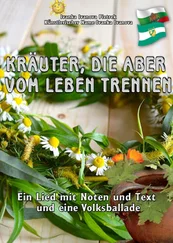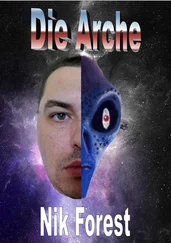He was overcome by an almost weary dejection. He could still turn back, ring her doorbell and give her a different answer. But what answer should he give?
So Judge Martin Vacek went on home.
When he opened the door of his own flat the familiar odour wafted towards him. Marie came out of the living room and greeted him as usual with the words: 'I'll have your dinner ready straight away'
He sat down at the table and stared silently ahead of him. He saw nothing. On the radio which his wife had switched on in the adjoining room someone was playing the violin. He found the sound of it so distressing he could hardly move. His wife placed a bowl of hot soup in front of him.
He knew he ought to say something, but he was filled with an emptiness that engulfed all speech. 'It's raining out,' he said eventually.
His wife looked out of the window in surprise. It had stopped raining long ago and the room was suffused with the dark red glow of the setting sun.
It was her custom not to contradict her husband, even though he had seemed to her more and more absent-minded just lately; perhaps old age was beginning to affect his mind.
'That's good,' she said, 'the farmers' fields could do with a bit of moisture.'
(1994)
Marie Anna Pavlů was almost twenty-six years old and worked as a nurse in a crèche. There was nothing striking about her appearance or behaviour. She had a pleasant face, a petite figure and a slight, almost deferential, stoop. She used no make-up and dressed simply, choosing darker shades of green and blue. Her most colourful feature was her hair which had a coppery sheen in the sun. Her expression was enlivened with a smile, particularly when dealing with children. The more attentive parents noticed that children tended to cry less when Marie welcomed them.
She had scarcely reached adulthood when she married Jakub Pavlů, a programmer. They had met at college. He was a good dancer and enjoyed company but drank moderately. He used to sing when he was in the mood — he had an enormous repertoire, as if he had an add-on memory in his head. Before they were married they used to leave every Friday afternoon with a group of his friends and go to a weekend chalet site. The little chalets were huddled together so closely that every word from
the neighbouring cabin — every breath — was clearly audible. When she and Jakub made love there — it was the only place they could make love at the time — she uttered no sound at all. He assumed that she was shy because of the lack of privacy: it didn't occur to him that she was not aroused by him. Subsequently, when they were already living together, her mute passivity might have become more noticeable, but by then he was used to it and accepted the fact that his wife was timid and reserved by nature. Besides, he was not one of those men who think about giving their partner sexual pleasure.
A son was born two years after their wedding and they named him Matouš. He was a quiet baby who seldom cried, and when Marie spoke to him he seemed to understand what she was saying but was simply unable to reply. However, he did start to speak earlier than little boys usually do. Before he was even three Marie became accustomed to chatting to him as if they were the same age. It seemed to her that he was capable of sensing her mood, so that he would laugh if she was feeling fine and try to humour her when she was miserable. Then he suddenly fell ill with thymic asthma and almost suffocated to death with the first unexpected fit of coughing.
From that moment Marie lived in fear of another bout returning and killing her little boy while she was asleep. She would often leap out of bed at night and run to listen to his breathing. Afterwards she would find herself weeping inexplicably. She was simply aware of a vague sorrow that life should contain so much alienation, suffering and death. She felt sorry for other people's children who were brought to her every morning half asleep and crying, and for her own Matouš, whom she too delivered up to strangers even though she knew he would prefer to stay with her.
She herself had had little contact with her parents as a child. Her mother, a bad reporter on a bad newspaper, was away on assignments most of the time. Her father was a drunkard and a gambler who moved out shortly after Marie was born. She only saw him a few times a year. She was mostly in the care of her maternal grandmother, who also lived alone, but remarried when Marie was ten years old. Although in his sixties, her grandmother's new husband was still a vigorous man. He was rather boisterous and talked a lot. He also spoke more loudly than other people, so that at first Marie was scared of him. He had barely moved in before he was decorating the living room — her favourite place — to suit himself. He unpacked books from tea chests and decked the walls with glass cases of moths, landscapes in oils by Romantic masters and several antique puppets. The room no longer looked like the one she had been used to. Whenever she was in it she was overcome with a feeling of dejection and slight dread as if in anticipation of some unwelcome surprise.
Her step-grandfather soon became fond of her and actually seemed to brighten up in her presence. He enjoyed chatting with her and wanted to hear all her news each day. He gave her the impression he was genuinely interested in her prattle. Back in what was for her the inconceivably distant past, he had been a teacher of natural history. He had taught for only a short time — three years after the war they had sacked him on the grounds of political unreliability. Since then, he had earned his living in all sorts of jobs — ending up as a museum attendant. 'I started with natural history collections and ended with them!' And he would laugh as if fate had played a clever trick on him. Everything he said seemed to turn into a succession of weird or funny stories and encounters, or homilies and words of
wisdom. Often she wouldn't understand them, but there were sentences or images that stayed in her memory. Sometimes when they went for walks together he would sniff with delight scents she had hardly noticed and point out to her the natural markings in a stone she had been oblivious to. He would encourage her to listen to the scarcely audible sounds of the forest, and at dusk would make her look up at the sky. 'Stargazing raises the spirits and brings relief at moments of trouble, because it puts everything — all your joys, quarrels and heartache — into proper perspective.' He would impress on her that one must never despair whatever happens, because life gives everyone a chance to make their mark through some deed or other — to shine, to rise above the seeming futility of human existence. The opportunity might come at any moment, and often it was unremarkable because it could easily involve something small rather than something large. It might be to do with the life of a woman, or the life of a tree; it might mean relieving the suffering of a person, or a bird, or of the water, or the air.
When she was fifteen, her grandfather suffered a stroke that left his legs paralysed. He would move around the flat on crutches but refused to let her help him. He used to sit in the big wing chair and tell her stories in a faltering voice. A few weeks later he suffered another stroke and lost the power of speech entirely. When she came to visit him in hospital he definitely recognized her, but his mouth was no longer capable of smiling. She leaned over and kissed him and then burst into tears. How much suffering the departure from this life can entail which no one else can relieve, even when the one departing is the person you love best of all.
When she first met Jakub, her grandfather was already long
dead, but it struck her that the moment her grandfather had spoken of had finally arrived. Something would change in their lives to rid them of triviality and the pathetic striving after ephemera. But nothing of the sort happened.
Читать дальше












